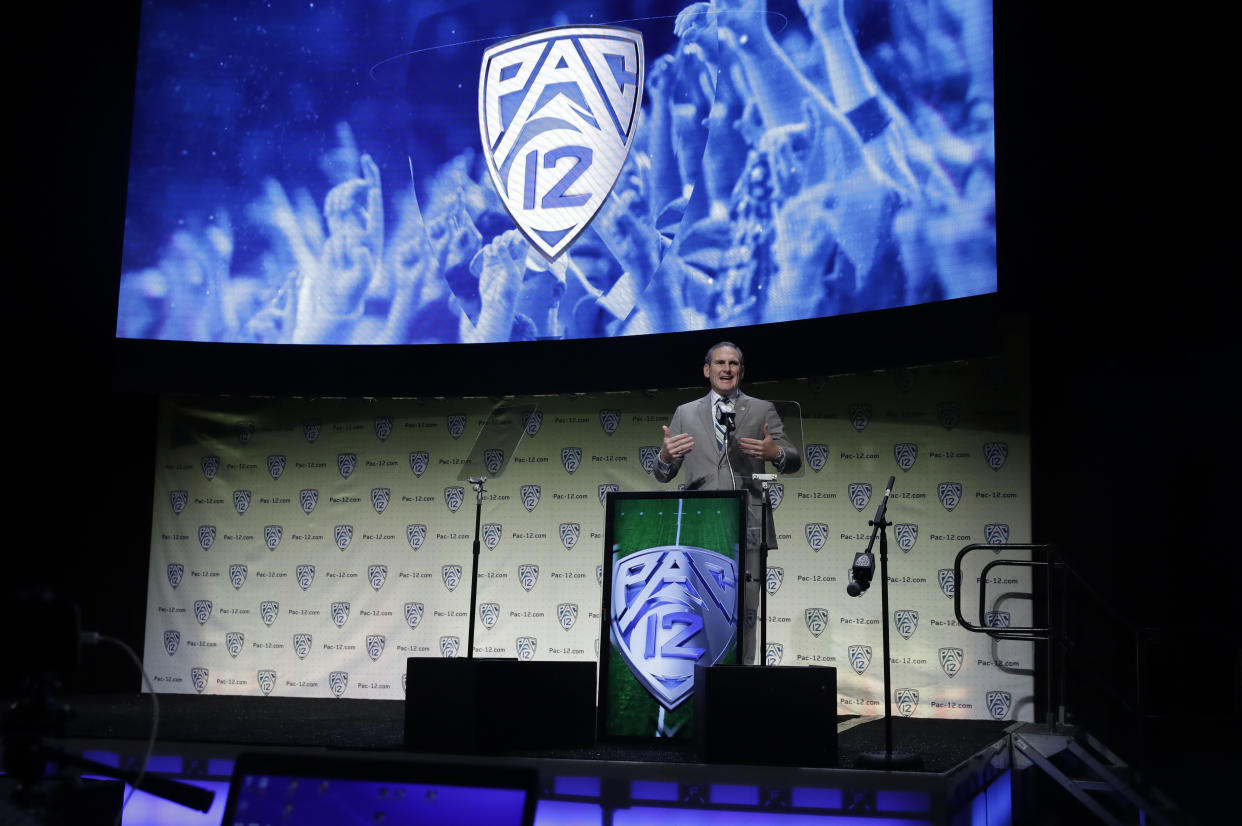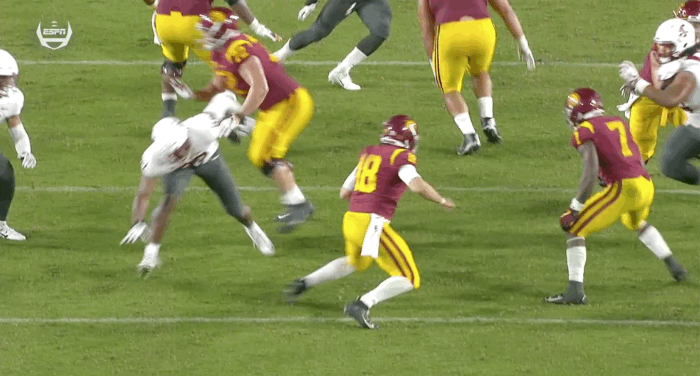Pac-12 to implement array of officiating changes after 2018 controversy

The Pac-12 is making changes to its officiating processes.
At the conference’s media day Wednesday, commissioner Larry Scott announced that an independent review of its football officiating was conducted by Sibson Consulting over a four-month span. While the review, which was overseen by a group of four Pac-12 athletic directors, concluded that the league’s officiating program is “fundamentally sound and predominantly consistent with industry best practice,” there were also, as Scott put it, “several very important areas that could be and need to be strengthened further.”
“Our work began in February and included benchmarking against the NFL and all four of our peer conferences,” Scott said. “It benefited from detailed input from all of our coaches, all of our athletics directors, current and former officials and other key stakeholders.”
USC-Washington State controversy sparks changes
Among the recommendations is an adjustment to the process that led to an incident reported by Yahoo Sports last October. Yahoo Sports reported that an untrained third party, Pac-12 general counsel Woodie Dixon, called into the league’s command center and overturned a targeting call during the USC vs. Washington State game.
In the summary findings of the review distributed Wednesday, Sibson said the incident “severely damaged” public trust of Pac-12 officiating.
“It is essential that stakeholders can trust that an officiating program is operating without bias or influence. The WSU vs. USC Incident severely damaged that trust among the stakeholders and the public,” Sibson’s review said.
In the immediate aftermath, Scott acknowledged that a mistake was made and promised changes would be made, quickly vowing to eliminate any influence from Dixon, who oversees football for the conference, and director of officiating David Coleman during games. He also promised long-term changes.
Starting with the 2019 season, the Pac-12’s head of officiating will “report directly” to Scott, rather than the football administrator (presumably Dixon). Additionally, the conference has instituted a new manual to “codify process and procedures that will eliminate the potential for an incident like the one in last year’s Washington State vs. USC game.” The manual will be distributed to coaches and athletic directors.
In that incident, both the replay booth and replay command center agreed that a targeting foul occurred, but Dixon “did not agree” and changed the call to just roughing the passer.
“Both the replay booth and the command center agreed this was a targeting foul, but unfortunately a third party did not agree so the targeting was removed and we went with the ruling on the field of [roughing the passer] with no targeting. This didn’t play well on TV. Reversed my stoppage for [targeting] to not [targeting],” an internal replay report obtained by Yahoo Sports said.

Pac-12 promises to be more transparent
On Wednesday, the conference also promised that it will “enhance” its training program for officials while offering “more consistency in grading and training” from officiating supervisors. Additional “transparency” to the public will also be implemented by introducing a “communications protocol” for offering public comment “around significant calls or errors that either impact player safety or the result of the game.”
“This will be an important step forward in terms of how and when we communicate based on the significance of any egregious errors that have an impact on player safety or the outcome of the game,” Scott said.
“This was a very extensive and comprehensive process, and as I mentioned, we are moving forward to implement all of the recommendations. We are committed to excellence, being the best we can be, and ensuring that our officiating program continues to improve and is as strong as possible.”
Specific findings from review of officiating
On the whole, Sibson found that the Pac-12 Officiating Program is “fundamentally sound” and the league’s officials are “the backbone of the program” and “show passion for their work.” However, it was concluded that there are many areas for improvement. Below are some of the more notable conclusions.
Grading and evaluating
“The current ranking system is too dependent on subjective measures.”
Training
“The clinic does not provide the officials with sufficient training, and needs to provide more clarity on specific play calling.”
“Officials do not have adequate personnel resources with whom to consult at the Pac-12 regarding rules and mechanics.”
Hiring and Recruiting
“The Pac-12 is the only Power Five Conference without an affiliated Group of Five recruiting and training partner for officiating, often called a “pipeline”, which is a major weakness.”
Communication
“The responses to coaches’ questions should have an increased focus on giving clear answers as to how the play should have been and will be called in the future.”
Supervisors
“Supervisors generally lack both recent on-field experience and recent NFL experience.”
“Supervisors do not train consistently and effectively.”
“Grading is not consistent across the group, and many lack rigor in their grading process, including a lack of commentary and poor specificity.”
More from Yahoo Sports:

 Yahoo Lifestyle
Yahoo Lifestyle 
